8th May 2022
The Spokesmen Cycling Podcast
EPISODE 296: Explore Your Boundaries
SPONSOR: Tern Bicycles
HOST: Carlton Reid
GUESTS: Marcus Stitz and Mark Beaumont
TOPICS: This show is 45 minutes with round the world cyclists Marcus Stitz and Mark Beaumont discussing their “explore your boundaries” bike-boat-ferry tour of Argyll, Scotland.
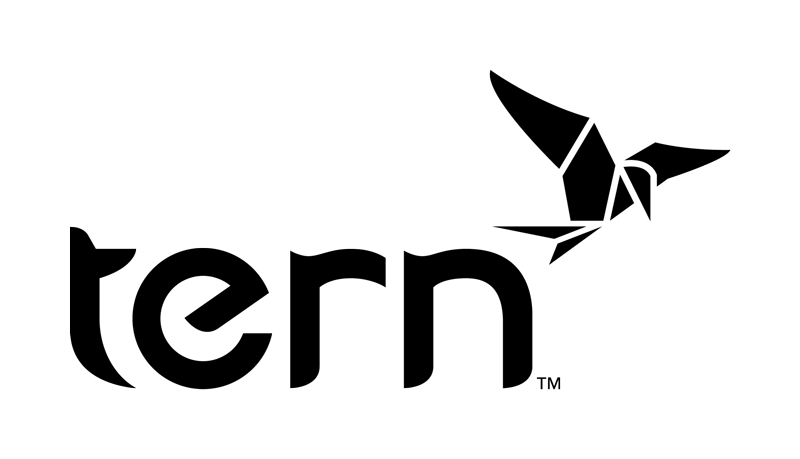
TRANSCRIPT:
Carlton Reid 0:05
Welcome to Episode 296 of the Spokesmen cycling podcast. This show was engineered on Sunday, eighth of May 2022.
David Bernstein 0:21
The Spokesmen cycling roundtable podcast is brought to you by Tern Bicycles. Good people at Tern committed to building bikes that are useful enough to ride every day, and dependable enough to carry the people you love. In other words, they make the kinds of bikes that they want to ride. Tern has e-bikes for every type of rider. Whether you’re commuting, taking your kids to school or even carrying another adult, visit www.ternbicycles.com. That’s t-e-r-n bicycles.com to learn more.
Carlton Reid 0:56
Thanks, David for that intro with our new sponsor, and welcome to the show, which is 40 minutes or so. With round the world cyclists, Marcus Stitz and Mark Beaumont. I’m Carlton Reid and I met with Marcus and Mark in Oban, Scotland before they set off on a week by boat and ferry trip around Argyll I was in town after my own little tour around the region, which Marcus helped organise. Thanks Marcus. And as you can tell from the clinking of cutlery, and a little bit of muzak we met for breakfast in a cafe — so where are we? Cafe Shore in Oban andyou’re about to head off you to on a bit of a wee trip whereabouts are you going yhis morning and you getting a boat that I hear yes sir physically can not ferry a boat.
Mark Beaumont 2:03
Yeah, really sorry to go it’s hard to go far. And I got all the hours without going on a boat. I mean, the mainland is beautiful. But you know, by by school it’s always just amazing when you when you when you go across to to the islands especially smaller islands which are you know, I guess less often explored by bike and when they are it’s often by Roubaix adding double bikes like we’ve got for this trip, you know, lasers to you know, really explore the, the complete range of terrain and I you know, I absolutely love as part of the world my my first memories were in a guy my dad was a, you know, a dairyman further down on the mainland. So my first memories were looking over to the isle of Gigha. And, you know, whilst they then grew up in other parts of Scotland, it’s it’s always pretty special to come back.
Carlton Reid 2:59
And then how long as this trend, so describe netting markets and markets describe what exactly are you doing from today? Because this is you doing this over a number of months only there’s not like,
Marcus Stitz 3:09
yeah, so we’re doing it over like it’s it’s nine days in total. The distance roughly is about 900 kilometres with like, a few bits and let’s and so this first part of the tour will take us we’re taking a boat, the charter boat, but actually which is also available to other people won’t be doing the same. We’re just wandering over from Quinn and harbour to the northern end of Juba. And then we’ll be staying recycling across Juba. And then we’re staying on Isla tonight. And then tomorrow we’ll be taking a ferry from Port askaig on Isla, over Caliente to open and then we’re taking another ferry over to Mo and then we’ll be cycling tilba mui. And then we’ll have a few votes on Sunday from Toba Mali to the Isle of coal. And then another ferry journey to Tyree from coal and then another boat trip back to
Carlton Reid 4:08
small boat trips on this then says there’s possibly definitely more
Marcus Stitz 4:11
because more and more kilometres and on peviot. But like, it’s interesting, because when I design as when we had to look at it, so the Argyll boundary is actually even more extensive because there’s so many little islands so you know, if you would want to add any of those in there, you’ll possibly spend 30 year cycling, boating around. But the idea behind creating the route is that it’s it’s accessible to most people. So the 72 private charters we have and, and the other parts of the world are quite interesting as well. So I’m going to be doing another three days of filming with Jenny Graham, which will involve kayaking across Loch Lomond and taking the Highland explorer train for shore journey as well. And then the last bit I will be mostly on the bike actually, that’s going to be where we’ve been mostly cycling. And we kayak journey over back to the moon.
Carlton Reid 5:08
So you’re really showcasing the region by doing everything you can.
Mark Beaumont 5:13
Yeah, I mean, the genesis for this project came out two years ago. Now, when Marcus and I are both living in Edinburgh, in the heart of lockdown, wanting to explore that concept to live by, you could go while staying close to home. So they explore your boundaries concept started on the second of January when we did a ener, D deep snow sort of an epic sort of ride slash pushing our bikes through the Pentlands and around the fact before, and it was quite cool that concept to an area that I know very well, Marcus may as well. But see if they are in unfamiliar ways. When When, when locked down was at its sort of feet, you know, we weren’t allowed to cross our council boundaries, and nobody really knows where their council boundary is. I mean, you might notice that the bins change colour, but you know, it’s not normally a thing unless you’re a counsellor. Well, actually, we’re recording this, on the sixth of May. So maybe today, people do care about where their council boundaries are, because it’s been the council elections being have been, but normally, it’s not really a thing. And so, Marcus, and I got all the GPX routes for the council boundaries in Scotland, and I just started to quietly encourage people to, you know, stay local, but, you know, go on adventures. And I think there’s something wonderful by giving a narrative, rather than just going on a bike ride, you’re, you’re actually instead of forcing yourself to stick to a line or to create a route, and then explore your boundaries, there’s more than metaphor than just a physical route, there was very much about sort of pushing yourself and having a great adventure. And that series,
checklist included, was not the only thing that you’ve got to move on.
So they say the first, the first four or five, explore your boundaries were all in central banks of Scotland. And the more we did, the more people seem to sort of latch on to that concept. And he posted the roots and commute and encourage people to explore their own areas. But the council bind us in the central belt of Scotland are all day lights or two day rides and most when you start to consider birth share, or, you know, I guess or our guy on the aisles or the high end, these are, these are much, much bigger challenges. And so when the Argyle is an area that I’ve explored last Marcus has explored law, but to take that concept of exploring your boundaries, and to try and come up with a route or a concept which would hopefully inspire other people to go on adventures was a bit more challenging and that’s where Marcus comes into his own. He’s an absolute sort of genius when it comes to to route setting and we’ve brought Jenny into this project. I think it’s fantastic that you know, we can split it into basically three 3d explorers and I think that’s more realistic for how people actually go on their adventures. You know, we’ve just taken Friday’s off and I adventure all days and then Sunday and you can go back to your job on a Monday having had this you know, extraordinary adventure across lots of islands and terrain. So this this will be our most challenging explore your boundaries yet for sure. It’s been challenging to even plan it and Marcus has done the heavy lifting on that but it’s it’s gonna be a tonne of fun, but it is it is continuing the series that is continuing this required dictate that idea I mean, people you know, Baglan rose people, you know, want to swim in every laugh. And, you know, I think for a gravel bike rider this concept and started are plenty three routes around, around around around each boundaries. It’s quite tantalising because uh, you end up taking your bike to parts of Scotland and the country that you wouldn’t normally have residency
Carlton Reid 9:26
and you’re gonna need fuel for this ride. Don’t let me stop listening to people going to work and this is your would I be right in thinking you both do this? This is your living. This is what you do. You ride your bike and you get painted
some of the time some of the town’s
clean have you guys make your money?
Mark Beaumont 10:00
Marcus, you go first.
Marcus Stitz 10:06
I guess for me, it’s, it does change. But I think the core concept of what I’m doing so I do three things, which is bike packing in Scotland, then my own stuff, which is under my own name. And then I want events as well, but they don’t really call it to come into this one. But I think most of my book is, has to work with, I think the overarching theme behind it is to get more people out on bikes, and also to offer them sustainable tourism alternatives, but really give people the tools to do it, because I think it is really important to, to, yeah, have offers for people so they can, they can get around the country in a different way. And so that’s the overarching thing about it. There’s, it’s a mixture of, I do a fair bit of filmmaking. So this this project is, is a good example of where I’m kind of jointly doing the filming, I’m doing the editing. Then I do, I do write and photograph as well. And then I’ve just written the book as well. And I think parts of this route is going to come into a new book I’m working on at the moment. And then there’s also a few companies I’ve worked with on a regular basis. So Schwalbe has been supporting us for quite a number of going go
Carlton Reid 11:28
check tires, knew the exact tire I was riding on my Brompton.
Marcus Stitz 11:31
Exactly, yeah, yes. Possibly, possibly like I’ve seen. But so they’ve been super helpful. I, I I only work with with partners from the industry where I think I’ve got a good feeling but loganair so swell, but it’s quite an interesting thing. What I really like is their ethos of sustainability. So as a company they’re trying as much as possible. And the other thing for me as I speak German to my portfolio of companies I work with is sometimes also companies which obviously
Carlton Reid 12:07
Mark is eating his porridge.
Mark Beaumont 12:15
yeah, so I was talking in Leeds when he a business I’ve worked for him for 17 years going from here to there. And that’s partly where
Carlton Reid 12:24
the money from so like you’ve gotten things on CDs and then get told to them to like to inspire.
Mark Beaumont 12:29
I love I love the opportunity to do events and talks, but it’s not it’s not my bread and butter. So you know, there’s a lot of a lot of athletes who do spend their lives but I don’t I run a early stage investment firm. So my my background and if you feel that people knew me as I was a bike rider, you know, it’s like learning the planet twice. Not there’s worse things to be known for but, and why I spend my time doing is as an athlete. I work for GCN I made a documentary recycling network. And these days that really accounts for one or two big projects a year major documentaries and then filmmaking with workers and you know, markets under sells himself there. His real skill debt is the exacting filmmaking you know, he’s a one man immediate shelter insofar as he can do the stills, the photography, the filming was wrong, you know, on the FBI, she has an extraordinary skill set when I was racing GB Judo last year, you know, he built that beautifully and ended the day. So, you know, to have that, to have that skill set to capture and share stories is amazing. I can’t I can’t do that. But but the other side of my life, which is just as important as writing mics is on the partner, an investment firm, and we we are impact investors, we focus on climate change solutions, clean technology, food and water security. You know, I’m a farmer’s son, and you know, I’m interested in the stuff I want to talk to my kids about are the big challenges in the world and trying to back science and technology, which is, you know, creating, creating creating solutions, global solutions for you know, stuff that keeps me up at night. We’ve also got some some healthcare lights thrown in there. So I realised sort of, we’re mixing two very different sides of my life, but I don’t I would I ride the bike because for a decade, right, a very fulfilling and successful career. You know, as an adventure athlete, I enjoy making training great each year and break records and do worldfirst I will always be an A, I love riding my bike. I love having the ability to push myself and hopefully inform and inspire others to go there and push their abilities. But it’s not it’s not my me work. I We do it if we do it by, or nothing from it, because I absolutely love adventure. You know, I absolutely love adventure. And this is a very meaningful part of my life, but in the next 20 years of my career, you know, will be different to the last 20 years of my career. And if I can, if I can back, if I can back up all ecosystems, businesses that are making a positive impact in the world, then that’s just as meaningful, as, you know, adventures like, you know, exploring wildlife.
Carlton Reid 15:31
What difference that may have until, to your to both
of those aspects of your life,
Mark Beaumont 15:37
I think the biggest difference was I didn’t want to be travelling. So if you think, I mean, I’m
Carlton Reid 15:46
Aborad? Here is OK?
Mark Beaumont 15:50
just mean time and time away. I don’t mean, I don’t mean where I mean, in my 20s, I would do expeditions that weren’t six, nine months. And, you know, we’ve been away with the BBC and filmmaking all over the planet for long periods is a completely different equation to get to help. And so, you, the racism projects I take on now all tend to be a month, as opposed to, you know, the last time I was away for a month on in was during the world media days, five years ago. So yeah, I still, I still feel like their confusion itself as hard as ever. As and in terms of my if you get geeky, like my numbers, my view tonight, my, my, my performance on the bike now, you know, I’m arguably a stronger rider, and I was gonna wait when I say drive the world, but I’m training for different thing. I’m going faster, but I’m not, I’m not going eating Vegas. In the summer, I’ll be doing Race Across America. And, you know, we’re, so I’m doing things on the ground. But when I don’t travel by nourishing yourself in different directions, as an athlete, I’m still learning I wish I’d known in my 20s Why No, no, you know, nearly 40 I love that. But, you know, my priorities are very different with, you know, two beautiful daughters to, you know, a different work life
balance. And also,
I’m not, I’m not, I’m not a freelancer in the sense that I can just go and ride my bike every day, you know, I’ve got a business to run. And I am in love with bands, I get balanced out with great adventure. And you’re
Carlton Reid 17:26
going to be when you’re running around with Marcus, or you’re going to be doing business deals on your phone
half way up a mountain.
Mark Beaumont 17:34
Marcus is pretty understandingly, Marcus has a great idea. And we’ve done so many projects over the years. So he doesn’t understand that, you know, I’m often chatting about, you know, because Because to be fair to market mark is massively interested in. He’s incredibly well read and very interested in the science, the technology, the innovation, you know, the things that we’re addressing, so we often end up riding our bikes talking about, you know, sustainability, talking about, you know, innovation in businesses and, you know, behaviour and all these things, which are absolutely what we’re trying to do at yields, which is the rest of my kind of my work. So I’m not, I’m not one of these people who’s entirely distracted the whole time and, you know, trying to go do me milk when you’re riding your bicycle, but I do see it as the same. The same thing. You know, when I’m on my bike, I often think I don’t meditate, but I do ride a bike, when I’m riding my bike, I’ve got time to think I’ve got time to talk to friends, I’ve got to really come up with ideas. Make connections. So it’s not like I draw a line, then I leave my laptop and go, Well, you know, I’m not doing that. And, you know, I’m very passionate about what I do on the investment side and very passionate about what I do on that adventure side. And thankfully, my guess is it’s very liquidy to conversations about where it’s going to be so he’s not yet hit the big red button and said sharp marks they’ll start talking about innovation.
Carlton Reid 19:03
Right? So Marcus has now quit with the information they’re polished up that breakfast is already great. For now Mark has got so we’re gonna we’re gonna
like we’re shuffling between each other. They’re not I want to come to
you though, and then just talk about and come either you’ve adopted Scott or Scott was adopted you What have you learned in Scotland? Where’s your background? Obviously, you cycled around the world
on a singletrack bike
what point did Scotland impact on your life?
Marcus Stitz 19:43
There were two points. So I came to Scotland over Sunderland actually, I studied how the year in Sunderland and others using using the train connection from Newcastle up to Edinburgh a number of times just to visit Scotland because it’s such a beautiful place and then I did an internship In 2005, in New York and had basically had a month to spare. So 2005, okay. And having been up to Edinburgh, I knew about the fringe, and afford like this quite opportunity I was at university back then create opportunity to get a summer job in Edinburgh and see what it’s like. And yeah, so I did a managing a box office in 2005, doing the bridge. Loved it, it was great. And I think this is kind of really shaped my view of Edinburgh as well, because it’s such an international town, very open minded, it’s like it’s, but it’s also traditional at the same time. It’s fairly Scottish. So, and then I kept coming back for years doing pretty much the same. Either being at university, or then I worked in New Zealand for a while. And then after, after living in New Zealand, for a while, I decided I’m going to go come back to Europe. And as, as I’ve been to Edinburgh, beforehand, for a few summers, I have, it’s just a natural choice. And yeah, this is how I ended up in Edinburgh, worked in the arts for quite a while. And then I had a bit of a career change in 2012. And started as Head of Marketing at Scottish swimming. And that was very much I think, part of the the session behind it was also, how can I use my skills based in the arts to work somewhere else was that they do something for a long, long time? Haven’t you become a bit tunnel vision. And the other reason was also, I just just wanted, yeah, it was just a theatre, it’s just change up that general life change a little bit. And the good thing about that job was it was it always has, it was a two month, a two year contract. Initially, I wanted something that has a limited timeframe, because I had this idea of cycling around the world in my head. And so that gave me the opportunity to say I’m going to do this, I’m really going to focus on that Korea pilot. For two and a half, it ended up being a little bit more than two years. But then there’s a break. And that point, it’s going to be cycling around the world. And then I’ll do whatever I’m going to do afterwards. I didn’t really think about that before I left so and and that’s kind of our ended up and which was interesting. So it’s been 34,000 kilometres cycling around the world. And there was very much with a focus already. I knew I wanted to do something different afterwards. And I was literally looking at houses safely managed in different countries. What’s the attitude just slightly? How do different countries use cycling as a tourism as a, as a travel alternative? countries like New Zealand are very interesting, for example, when it comes to that. And so when I came back from the Vanderbilts group, and this is why this trip was really interesting, I ended up in Fort Ellyn on Isla, there was the first part of Scotland as because I took a real ferry over from Northern Ireland. And the last four days cycling and Scotland really caught home the idea this is an amazing country, like we’ve got so much opportunity here. And we’re just picking it just, it just needs us and it needs fresh ideas and needs. And it’s people behind that really, that really pioneer ideas. And that’s kind of where the idea of bike packing started and all the work I’m doing why now?
Carlton Reid 23:22
And does it work? Does the
Tourist Board think wow, this has really boosted our numbers? Or is it something very niche? Where do you think it fits into the
ecosystem?
Marcus Stitz 23:32
It has a big it was very niche when I started doing it has massively, or at least noted, notably changed in the last two years in the pandemic? I think beforehand, and then also with the whole discussion about sustainability. I think people now do realise things need to change and they also realised that they haven’t changed quick enough. Still, I think the ecosystem in which we’re operating now is a very different one. I think we’re still I just did a destination Leadership Programme at the university to kind of backup my my my skills a little bit. And it was really interesting. I think there is a there is a real there. But there’s a very significant lack of acknowledging that people don’t know what cyclists want to his business don’t don’t have an idea. And I always think if you tell them that and you make it very clear to them, they’re really receptive. I’m yet to find any business whatever, we don’t want any cyclists to visit us because they you know, they arrive late and leave early they eat loads of brilliant light from from, you know, from from what people actually spend the community and the way how would they expect it? It’s just I could not think of anything better for our community.
Carlton Reid 24:53
They don’t really know busing me in loads of food. Are you in a big camper van? No, you’re basically by If you’re good to the local economy
Marcus Stitz 25:02
yeah and you don’t need even your infrastructure is minimal what you need when you don’t need any parking spaces for people overnight. Thanks for like this. So and I think this and this also like, I think people cycling in terms of food, they can only take so much alibi if I recognise that I’m around the world for three days if you’re doing it self support, that is the maximum you can take. So, you know, you’ll end up buying your stuff in local shops, and which I think is a really nice thing to do. So yeah,
David Bernstein 25:31
hey, everyone, Excuse the interruption, but this is David from the Fred cast and the spokesman. I just want to take a few moments out of the show to talk to you about our sponsor, turn bicycles at www.ternbicycles.com. That’s t e r n, like the bird turn. bicycles.com Tern are committed to building bikes that are useful enough to ride every day, and dependable enough to carry the people you love. And today, I want to tell you about their new quick haul ebike. The Quick-haul is a compact ebike and it’s it’s optimised to make life in the city just a little bit easier, a little bit more convenient, and a lot more fun. It’s a compact ebike. And it’s kind of handle most of your daily trips around town, it’s rated to a hefty 150 kilos, or for those of us Americans 330 pound Max gross vehicle weight. And it’s got an ecosystem of modular accessories. This is really cool, by the way, so that it can be customised for any job. different setups are going to help you carry a load of cargo, maybe an extra passenger, and that could be a small adult, a child or even your dog or cat. Now despite its longer wheelbase, and its hefty cargo capacity, it’s shorter than a regular bike. It’s a compact design, plus it’s got 20 inch wheels. And that makes the quick haul easier to manoeuvre on urban streets, or maybe even in transit hubs like train stations or bus depots or even ferry terminals. It also includes turns vertical parking parking feature, which is really cool, so that you can just roll the bike into a small elevator or pocketed a quarter of your apartment. Now, the quick haul is also shareable by literally everyone in the family. It’s equipped with an adjustable seat post and stem so that it can fit riders from 160 to 195 centimetres or five foot three to six foot five, but it also fits riders 145 to 180 centimetres, which is four nine to five foot 11 When you put on the shorter seat posts now Josh Hon, who is Tern’s team captain, and also somebody both Carlton, and I have known personally for a very long time, don’t ask me and Josh how long we’ve known each other. Josh is serious about ensuring the safety of Tern’s bikes and its riders. So that’s why he and his team ensure that every turn bike is designed and independently tested to ensure rider safety. That’s why they use respected independent testing labs, and why they sourced their motors, their drive trains and their batteries from German industrial powerhouse, Bosch, it just doesn’t get much better than that. So for more information about the Quick haul, or any of Tern’s wide range of bikes, just head on over to Ternbicycles.com. That’s t e r n bicycles.com. We thank turn for their sponsorship of the Spokesmen podcast. And we thank you for your support of Tern, and also for allowing this brief interruption of the show. Now back to Carlton and the spokesmen.
Mark Beaumont 28:55
A big a big part of a conversation is about how do you get good information out that allows people to know how to access these areas. I mean, it’s nearly 10 years since the wildfire Gao so you know we’re sitting here and open. Wildfire, Gao started, Karen Toobin came up with that sort of project with myself and others and I spent 12 days exploring this beautiful area, but a big conversation that came up. It’s a real case of you know, build it and they’ll come because until you build a narrative, give it a brand. You know, we’ve seen that in other parts of Scotland. I mean, here’s, you know, the adventure coast up in the north coast of Scotland then see 500 You know, these, the putting putting locations on the map, and then giving people credible information in terms of how to get there. So it’s one thing saying that the islands on the west coast of Scotland are beautiful, but you’ve actually got to help people in terms of how to get there with their bikes. So you know, during the connections with you know, the trains from London for example, you can get sleeper train up on a Thursday night or a Friday night and wake up and you’re you’re ready Did you go? Or how did you get the bus with? You know, with bike spaces on it, you know, how do you go from Glasgow, to central belt of Scotland, you know, to these parts, you know, what’s the ferry network, like, it’s not rocket science, but equally, it’s not. It’s not information you’re born with. So a lot of the narrative over the last sort of 10 years has been paid up a credible information, which is not just picture postcard, this is a great place to, you know, take your bicycle and communities that you want to explore. But, you know, what’s the toolkit? How do you do it, and when I say build it, and they’ll come, when we started the, you know, the wild about a girl project, you know, 10 years ago, it then got picked up by Visit Scotland and amplified. And I think we knew, and we needed to start creating content, we needed to start, you know, putting out infant information before, you know, other organisations went, Oh, this is great. It fits our it fits our agenda as well. And it’s, you know, it’s very clear whether you’re talking about, you know, public support through, you know, destination tourism, whether you’re talking about businesses, you know, whether you’re talking, there’s the rising tide floats, many boats, there’s a lot of interest, but I think it’s leadership is having people who actually have the idea is to get people together and put out credible information.
Carlton Reid 31:17
You guys have got to go, you’ve got a boat to catch it. And that’s your own boat.
Mark Beaumont 31:21
I don’t know, this is quite fun, I could go on a bit longer.
Carlton Reid 31:25
Well, you need to plug your stuff now. Sounds good on Marcus, and you’ve got a book we have close to actually physically coming out is your book and tell us about your book.
Marcus Stitz 31:33
Oh, it’s actually in the printer, which is great. So there’s no changes any longer, which is a fabulous thing. So it will be coming out on the seventh of July as the publishing rate. And the books called Great British travel rights. And the idea behind that this is again, what Mark’s just been saying, I think you’d like whoever whiting’s been such a fast growing thing, sport, whatever you want to call it, especially in the UK. And my idea was like to write a guide. But I also want to portray to people who are behind the voice of thought and clever, clever avoiding if you if you take a very poor definition has been a long it’s been around since people have written their bikes. And cars, they’ve always been started travel books, and then we had tonic. So I portrayed 25 people and their favourite routes with them.
Carlton Reid 32:26
And Jo Burt.
Marcus Stitz 32:28
Yeah, we’ve got Jo Burt. So this like marks and as well, Jenny, then Amelia McKenna. She’s a, she lives in the borders, and she’s really a champion when it comes to like their favourite rides. Is that pretty much? Yeah, yeah. Yeah. So it’s, and most of them, most of them are where the people look for as well. So it is in their own path.
Carlton Reid 32:49
Similar to this, you’re doing so it’s like it’s more your boundaries, but gravel rides close to home?
Marcus Stitz 32:53
much. Yeah. And there was a very, very interesting theme that came, which I didn’t really think about at the beginning when I started researching it, but it came to very, very well that the reason why a lot of people picked up quell bikes in the UK, this was during lockdown, because those are the bikes do, you can write them from your front door, and they’ll get you anywhere, pretty much, you know, they’re kind of a good alternative between a road bike and a mountain bike. So you can you know, you can do the odd bit awkward to it. So, ya know, there’s of quite, quite BowTech, then there’ll be a documentary about this as well. So I basically filmed and photographed those roots, and all the pictures, selection of the pictures made it into the book. And now I’m working on the film, which is we must, hopefully a really nice portrayal of how diverse and how interesting the prevalence scene is. And there’s two things about the book as well as so the sustainability theme is in there as well, I, I often thought that a lot of white books are very much focused on costs. So I did the research and most of the data accessible by public transport. But some of them people need to avoid a little bit longer to get to the start point. But that was one of the key ideas. And it’s also there’s a 60 or 58/42 ratio of men and women and because I always felt like cycling is such a male dominated sport, especially how it is portrayed in the media. And I really want to navic That’s the huge opportunity of gravel riding because I think it’s huge. It has started from from a very different starting point. So and I’ve got two women of colour in there as well. It’s just I’ve tried to try to portray, I think cycling is really diverse. And it’s a really interesting activity because it is really accessible. You can you can write, you know, you can buy you can buy a bike for 200 pounds, and you can have fun, avoid some of the routes on it. And that was the idea behind it. So yeah I’m really looking forward to it.
Carlton Reid 34:49
And where can people preorder who’s, who’s the publisher basically?
Unknown Speaker 34:53
Ao the publisher’s Vertebrate. They can pre order it on Adventure books.com or through us Without let’s they’ll be available on
Carlton Reid 35:02
And just standard plug your social media. So where can people I’m sure they do follow you anyway.
Marcus Stitz 35:06
yeah, that’s, which is a Yeah. So they can follow me. I think it’s like Twitter and Instagram, which are the two main channels, it’s quite cool to have, which is a bit that thing long back to my German data sets, I said Kult loanee Was that I never saw. It was basically a name, I’d given myself myself and acquainted with each eight in Germany I did for 12 years. And that was our DJ name. So it was so nice. I think there must have been the first time when I used to return via Instagram wasn’t born by then. But then I kind of adopted that handle across all channels, and the authority just by typing in markers sticks. Yeah, there’s easy and if they are single speed to this Google Search still very clearly binary,
Carlton Reid 35:51
excellent. And coming for us to know where What do you want to plug in the name of projects you’ve been doing that you want to just talk about all your social media would want to
Mark Beaumont 36:01
Buy Marcus’s book? Well, what have I got going on? There’s Race Across America happening in June, I’m not sure when you’re going to put out this, this conversation. But that’s going to be an interesting race. So with GCN, my I’m doing as a pair, and my race partners, a guy called Jonathan Schubert, who’s a time trial specialist. So that’s been a lot of focus and training this year, and the epic coast to coast and we hope to break the record, from West Coast East Coast going just south of Los Angeles to Baltimore, we’ll hope to get across America in about six and a half, seven days. And that’s not self supported. You’ve got a truck behind you. Yeah, that’s that’s an absolute all a race. It’s absolutely at the sharp end of performance very, very different to these, these these backpacking adventures. And that’s the GCN film I’ve got, I’ve got a book coming out in the summer, all about sports psychology, cycling psychology. So I wrote a book a couple of years ago with Laura Penhold, my performance manager called endurance, which was kind of all the frequently asked questions I’ve been asked over the last 20 years about how to go further. And the chapter that I think I enjoyed the most. And I felt there was a lot lot more to say was psychology and mindset. And one of my key contributors for that was a San Francisco based sports psych, called Dr. Jim Taylor. So when the when the when the insurance book did well. The publishers came back and said, What would you write about next? And I said, Well, could we take that chapter and really develop it? So we’ve just finished writing, writing that and we all know that to be a good bike rider, you need to train physically. And we all know that. Mindset, emotions, identity, are a huge important part in terms of our performance as well. But even though we know that we don’t really do anything about it, it’s just sort of are you born with it? Is it just experience, but there’s no, there’s no way to train that really the way you train physically. So Jim brought a huge amount of knowledge, having worked with top flight, US teams in skiing, and cycling and triathlon. And I brought my life of experience. And it was really interesting working with somebody who could bring, you know, a language and a way of describing what I’m very interested in, you know, I’ve always felt like my ability as a bike rider is not because of who I am physically, is actually your ability to think your way through the task and, you know, endure in the simplest sense, so yeah, looking forward to that command in summer.
Carlton Reid 38:46
So that’s in July, August. It’s actually meant to time as
Mark Beaumont 38:50
so yeah, I’ll probably come out just after Marcus’s book, publisher GCN GCM. Publishing. Yep. Okay. Yeah, my first books were all Penguin Random House. So the ones which are the expedition books, but my last two which are more How To books information, books are published through GCN.
Carlton Reid 39:08
And then Twitter it’s MrMarkBeaumont.
Mark Beaumont 39:11
yep, I’m dead easy to find. Just like Walmart. There is a mark Beaumont who paints horses and there’s a mark Beaumon, who’s a music journalist, I often get tweets. I often get tweets from people really annoyed that I’ve slagged off their rock band. And that’s not me.
Carlton Reid 39:28
What’s that on your arm?
Unknown Speaker 39:30
So Supersapien. So super Sapien. So it’s a glucose monitor.
Carlton Reid 39:34
And so that’s normally for diabetics?
Mark Beaumont 39:37
Yeah, it was born out of people with type 1.
Carlton Reid 39:39
My wife went and she’s not diabetic, which is a diabetic doctor. So she often wears stuff like that. Yeah. This is now the tech for athletes to wear.
Unknown Speaker 39:47
Yeah, exaclty. you can see my croissant and porridge is kicking in at the moment. So I was when I met you this morning. I was actually very low. And for everyone listening we’re looking at graph right now. I’m, and there’s a massive spike as I’ve fueled now. And whilst I’m in sort of a passive recovery mode here, that’s all fine. But if I was to go into a performance mode, this is exactly the same graph, but with a different range on it. And I’m now in a space where I should get on my bike and start pedalling. But if I’d done that an hour ago, under fueled, my performance would have been suboptimal. So yeah, no, so it’s called a super sapien, it’s, it’s very much about, you know, 15 years ago, people geeked out on heart rate, and then people geeked out on power. And, you know, layering on top of that, and understanding of what’s happening with your, you know, your energy systems is super dressed for that,
Carlton Reid 40:36
well, you’ve had some breakfast, you know, go right.
Why would you do that? You geeking out on the graph there when when the human physiology which is full of off? Well, you think,
Mark Beaumont 40:47
yeah, I mean, there’s an intuition about it, there’s a there’s a common sense element. But we’re not as objective as you might hope we are like, when you’re when you’re shattered, when you’re sleep deprived, when you’re pushing yourself through ultra endurance. You know, if you have a physiological bonk, if you hit the wall, it’s normally correspondent with a nutritional crash. And people don’t feel because their legs feel people feel because their gut feels normally. So the psychology and the nutritional side of cycling. Cyclists just want to cycle and they think it’s all about how strong their muscles are. But actually, they take care of themselves if the mindset and the nutritionist is correct. So I don’t think we are, I don’t think we’re as good as you’re suggesting we are at knowing ourselves. And I think we should never, we should never rely on data to the point where we lose sort of the ability to sort of listen to our own body. But it’s very, very, it’s very, very useful and helpful to have some science behind that. I know when I’m racing. In a ram, I’ll need about 110 grammes of carbohydrates an hour to be able to sit at 260 watts. You know, I know, I know, my numbers. And so it’s pretty clear, then backing that up if I’m under fueling. And so yeah, maybe that would kill the fun for some people, but I’m in the business of, and I have been for my whole career of trying to break down barriers, like people, you know, criticise me for ruining a good bike ride by going too fast. But I’ve always been trying to not just break records, but create leaps in performance. I try to do stuff that’s not been done before, not because I’m trying to beat other people, but because I’m very, very interested in what’s possible what my personal best is. And so data data is really helpful. And sort of, you know, I genuinely do wish I’d known some of this. When I first cycled around the world 17 years ago, I mean, back then I really was a wild man adventurer, and I trained much better than than I did 1520 years ago, but so part of the evolution
Carlton Reid 43:00
Thanks to Marcus Stitz and Mark Beaumont there. And thanks also to you for listening to Episode 296 of the Spokesmen cycling podcast now brought to you in association with Tern Bicycle. Watch out for the next episode popping up in your feed real soon. But meanwhile, get out there and ride.
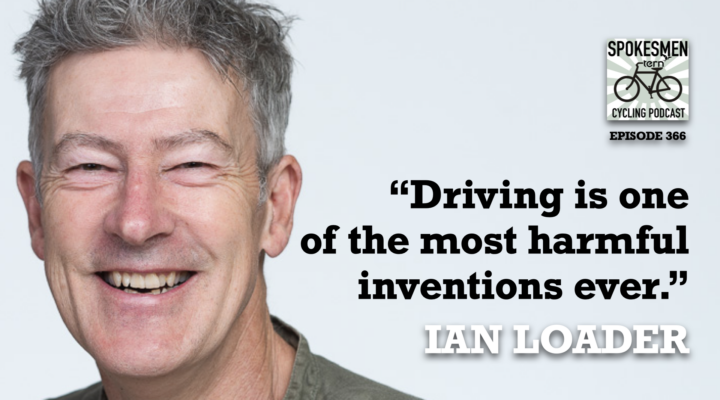
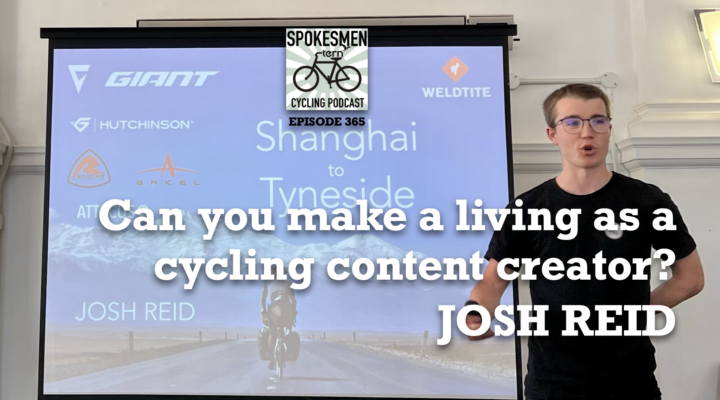
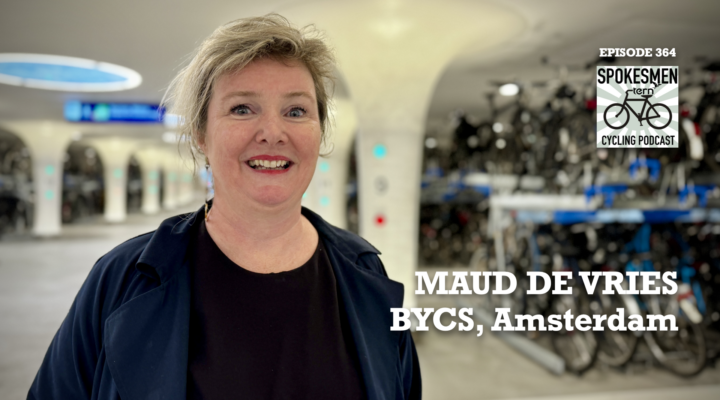
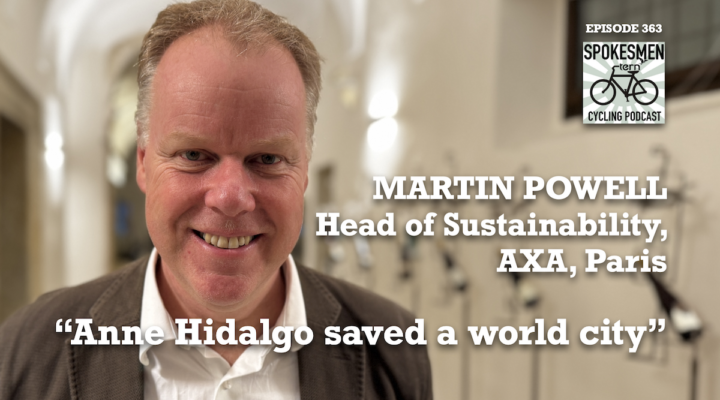
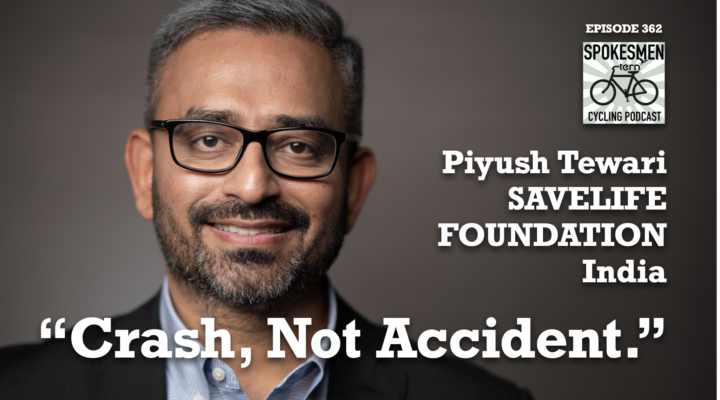
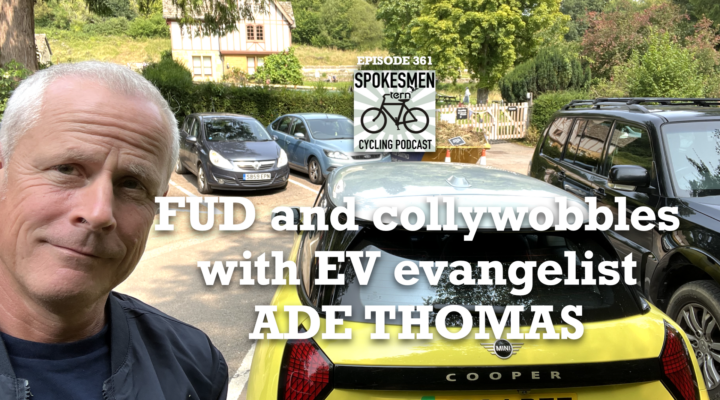
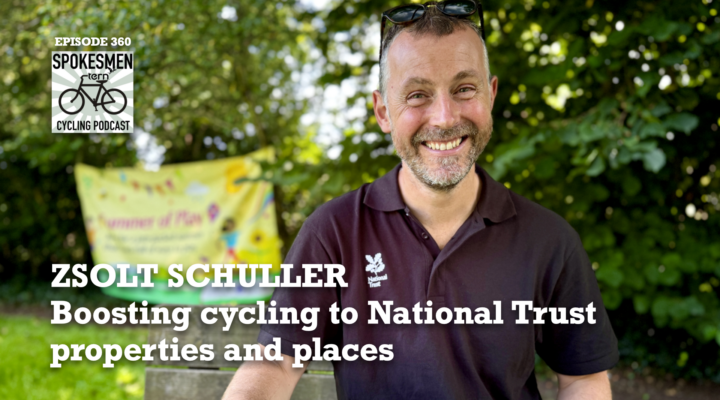
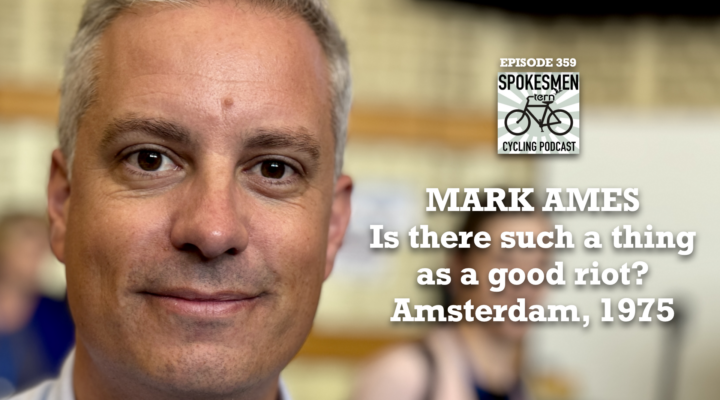
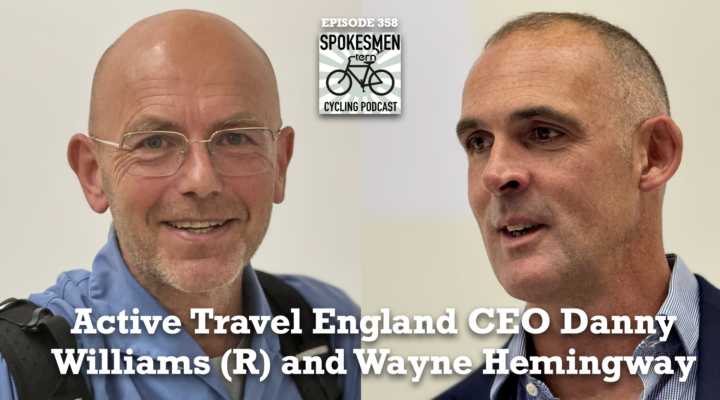
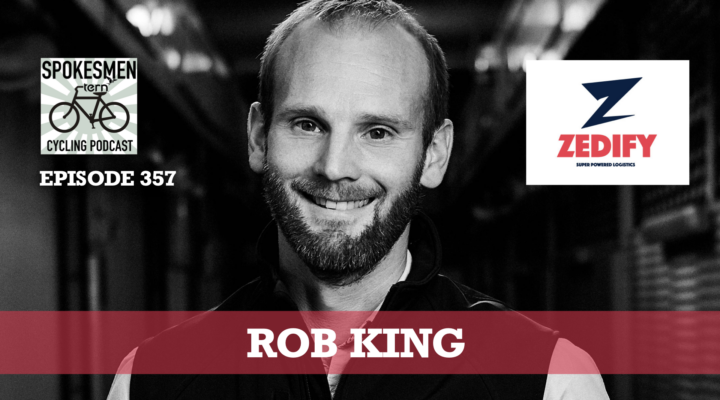
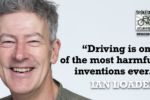
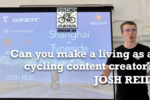
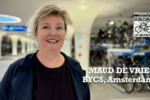
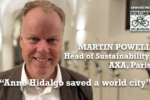
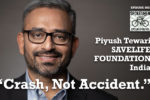
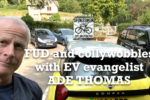
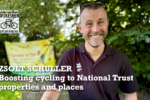
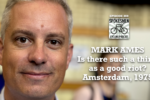
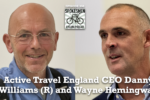
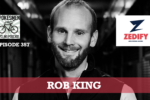
Be First to Comment